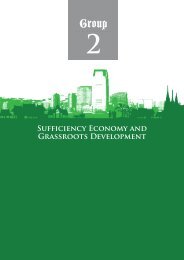Conflict, Legitimacy and Government Reform: Equitable Allocation of ...
Conflict, Legitimacy and Government Reform: Equitable Allocation of ...
Conflict, Legitimacy and Government Reform: Equitable Allocation of ...
You also want an ePaper? Increase the reach of your titles
YUMPU automatically turns print PDFs into web optimized ePapers that Google loves.
Judicial Review <strong>and</strong> Judicial Activism<br />
“Judicial Governance” is a criticism leveled by people who believe<br />
that justice <strong>of</strong>ficials act inappropriately or beyond their legitimate legal<br />
authority when checking the exercise <strong>of</strong> power by the executive or the<br />
legislature. It is strong criticism <strong>of</strong> the judicial institution that should be<br />
considered by all parties concerned. In particular, every judicial<br />
organization should strictly check its own performance, like accelerating<br />
the expansion <strong>of</strong> new legal knowledge <strong>and</strong> sticking to procedure when<br />
judging cases in order to make all parties involved trust that the court has<br />
always attached great importance to bringing justice without<br />
discrimination or prejudice towards any individual or case. More<br />
importantly, performance must be checked <strong>and</strong> transparent to confirm<br />
that judges perform their duties by taking into consideration their<br />
responsibility to the society <strong>and</strong> parties concerned. The exercise <strong>of</strong><br />
judicial power to judge a case must be based on facts <strong>and</strong> the application<br />
<strong>of</strong> law, which comes from a rational judging process with completely no<br />
prejudice toward any parties.<br />
143














